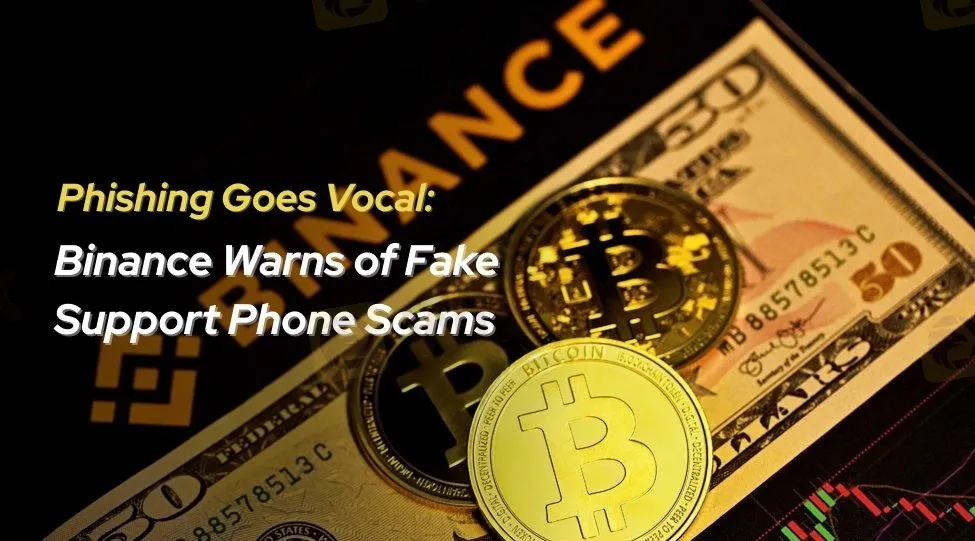简体中文
繁體中文
English
Pусский
日本語
ภาษาไทย
Tiếng Việt
Bahasa Indonesia
Español
हिन्दी
Filippiiniläinen
Français
Deutsch
Português
Türkçe
한국어
العربية
Phishing Goes Vocal: Binance Warns of Fake Support Phone Scams
Abstract:Binance introduces SMS-based security codes as scammers shift tactics from links to phone call traps.

Cryptocurrency exchange Binance has issued a warning regarding a wave of phishing scams that are now taking the form of SMS messages urging recipients to call a fake support number, rather than clicking a suspicious link.
These messages, designed to appear urgent and official, often include prompts such as “Not you?” to create anxiety and pressure the target into making a phone call. The scammers behind these messages then attempt to extract sensitive information by posing as Binance support representatives over the phone.
In response, Binance has extended its Anti-Phishing Code—a user-customized security tag that previously applied to email communication—to SMS notifications. This code helps users verify that a message truly originates from Binance. The feature is now available in all jurisdictions where the platform is officially licensed to operate.
Binances Chief Security Officer, Jimmy Su, confirmed in a statement to BeInCrypto that the company is aware of the increasing number of such scams. “Scammers are using SMS to impersonate Binance and other legitimate senders. These messages often look credible and trick users into revealing credentials or transferring funds,” Su stated.
Binance noted that both users and non-users have reported receiving these messages, suggesting that attackers may be using third-party databases to target phone numbers, regardless of whether the individuals are active Binance customers.
To combat this, Binance recommends verifying the presence of the Anti-Phishing Code in all official messages and encourages users to avoid calling phone numbers embedded in unsolicited texts. Instead, users should confirm all activity directly through the official app or website.
In addition to enabling the Anti-Phishing Code, Binance advises turning on multi-factor authentication and refraining from sharing personal or account-related information by phone. Any suspicious communication should be reported to the platforms support team for investigation.
This latest adaptation of phishing tactics underlines the evolving nature of social engineering in the cryptocurrency space. Rather than relying solely on malicious links, fraudsters are now increasingly turning to direct phone contact—adding a vocal layer to their deception.
Disclaimer:
The views in this article only represent the author's personal views, and do not constitute investment advice on this platform. This platform does not guarantee the accuracy, completeness and timeliness of the information in the article, and will not be liable for any loss caused by the use of or reliance on the information in the article.
Read more

Exnova Broker 2025: Shocking Scam Cases and User Horror Stories
Exnova Broker 2025: Disturbing scam cases revealed! Frozen accounts, $10,000 losses, and ignored withdrawals plague users. Unregulated with a 1.39 WikiFX score—steer clear!

Cloned Layouts, Fake Reviews: A Closer Look at Two Scam Network Cases
Identical websites, different names—same scam. See how fraudsters are cloning trading platforms and fabricating 5-star reviews to lure investors.

When 'Malaysia JP Morgan' Isn’t Real: Housewife Lost RM447,300
A woman in her sixties from Sibu, Malaysia, lost RM447,300 to a fraudulent investment scheme that promised lucrative returns but ultimately delivered nothing.

Unauthorized Online Platforms Exposed by BaFin in Latest Report
BaFin has flagged a growing list of online platforms operating without authorisation in Germany. Many are linked to unlicensed activity and misleading branding tactics.
WikiFX Broker
Latest News
Unauthorized Online Platforms Exposed by BaFin in Latest Report
How Does CFI Academy Empower Traders of All Levels?
Close Up with WikiFX: TMGM's Presence in Thailand
Crypto Never Sleeps with Hantec Markets' 24/7 Trading
Swissquote Enhances Trading with Full TradingView Integration
Exness Launches Bold New Campaign Celebrating Traders Success
OneRoyal Teams Up with Global Icon Diego Forlán and Unveils Powerful Forex VPS Hosting
Is Saxo Broker the Right Choice for Serious Traders in 2025?
Cloned Layouts, Fake Reviews: A Closer Look at Two Scam Network Cases
They Let Him Win First, Then Scammed RM5.3 Million
Currency Calculator




